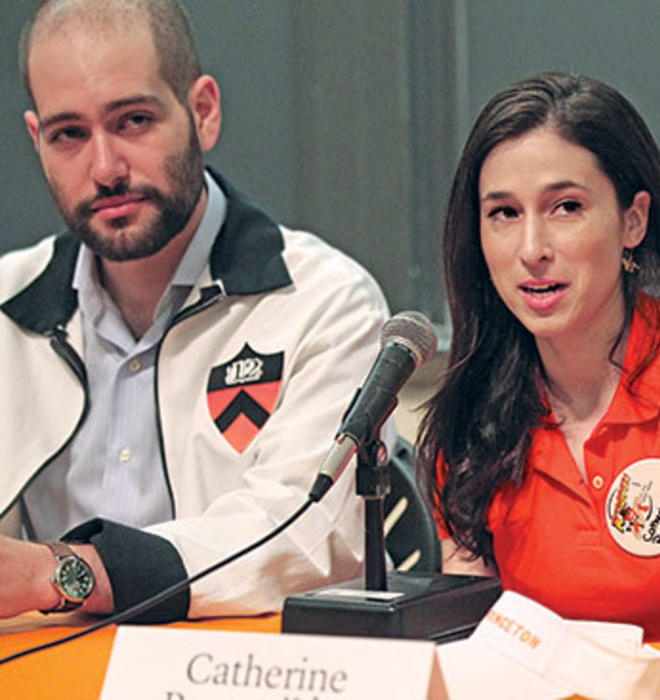
At an annual Reunions panel of journalists, sponsored by PAW and the Ferris journalism program of the Council of the Humanities, moderator Nancy Cordes *99, chief congressional correspondent for CBS News, kicked off the session on this note: “Everyone on this panel, I think it’s safe to say, has had an official or campaign aide or member of Congress accuse them of peddling fake news.” Her remarks were met with somber nods by the panelists.
“You can tell that Trump is taking up all of the oxygen because most of the international news is on the weekend — you file the story on Monday and it sits and sits and finally it runs on Saturday.” — Deborah Amos
The journalists focused on some of the questions they encounter daily as they cover a president and Congress willing to abandon traditions of governing. Should they use the word “lie” in covering statements by President Donald Trump that are known to be untrue? Most said they should not.
“We don’t know whether Trump is lying, ignorant, simply mistaken, or just playing games,” said Washington Post editor and Trump biographer Marc Fisher ’80. “I think to pretend that we know his psychological motivations misleads the reader.”
But Fisher’s former Post colleague Barton Gellman ’82, a senior fellow at the Century Foundation, made a case for the “L” word in some situations: “Let’s say Trump says, ‘I just got a call from the head of the Boy Scouts who said I just gave the best speech,’ but you know there was no call. That is a knowable fact, and I’m perfectly happy calling that a lie,” he said. “It is difficult to know when he’s playing games, but it’s not impossible.”
“The greatest struggle is to deliver non-Trump news in a way that is responsible when we have a president who wants to be in the news at all times.” — Gabriel Debenedetti ’12
Rick Klein ’98, political director at ABC News, asserted that Trump knows more about the media business — its rhythms and news cycles and recent industry trends — than even the people who work in media companies. “Recognizing that and understanding the art of what he’s doing is at least one little step toward explaining to the public what’s going on,” Klein said. “Understanding that, and not overreacting to whatever random thing he tweets out during executive time in the White House in the morning, is an important step for us.”
For Deborah Amos, international correspondent for NPR and a Ferris journalism professor, a central concern is how Facebook and Twitter can be wielded to influence public opinion — tools she said are being used by governments in countries including Russia, Saudi Arabia, and the United Arab Emirates. “We are easily manipulated through Facebook and bots,” she said. “I find that more worrying than how governments deal with their own press. And there is a phenomenon now that you can move public opinion in America.”
“We had the beacon of press freedom and advocated for more press freedom in other countries, and, I think, we no longer hold that moral role.” — Catherine Rampell ’07
Gabriel Debenedetti ’12, a national correspondent for New York magazine, cast doubt on CEO Mark Zuckerberg’s assertions that Facebook will fix its model to eradicate propaganda. “The one thing Facebook has been very consistent about is, ‘We’re not a media company, we’re a tech company,’ and when they say that, they’re absolving themselves of all responsibility.”
Fisher responded: “That claim is meant purely for their own legal protection so they [are not] responsible under the laws of libel,” he said. “That’s the original sin of social media, and it’s probably irresolvable.” He added that most media companies find themselves beholden to social-media audiences but remain wary of the platforms nevertheless.
“I know a lot of reporters — some good, some bad. I don’t know any fake-news reporters.” — Rick Klein ’98
One audience member asked if the panel felt that the Trump administration’s approach to truth and facts portends a rise in authoritarianism.
“Press coverage of McCarthyism or Watergate [had] little impact on public opinion, but then a threshold was reached and everything tipped,” Fisher said. “All populist movements end in that kind of strange moment where everyone who hadn’t been listening suddenly is given the freedom to make their own decision, and they come back.”
“You’re more optimistic than me,” replied Catherine Rampell ’07, opinion writer for The Washington Post. “You’re not going to have diehard Trump supporters believe any of these scandals until Rupert Murdoch decides he doesn’t support Trump anymore. Not as long as Fox News remains the most popular cable-news network, and it exists not as a conservative organization but as a mouthpiece for the president.”
“I have a big problem with Facebook — the algorithms push you more and more to the extreme and therefore less and less true content.” — Barton Gellman ’82
Other panels also dealt with the media and politics, including a Friday-afternoon panel on “The Evolution of Journalism,” at which Fox & Friends Weekend co-host Pete Hegseth ’03 questioned social media’s ability to adjudicate what constitutes “healthy discourse.” “I don’t trust whoever it is in Silicon Valley to determine what’s acceptable and what isn’t acceptable,” Hegseth said. “And we’ve seen conservative speech muted and sometimes blocked on places like Facebook and YouTube ... . [I]f it’s being blocked by someone who I don’t know and I don’t trust to be a fair arbiter, that’s not free speech — that’s the publisher deciding what’s posted on their channel, pretending to be a platform.”
At “Is the Party Over?,” a panel about the future of political parties in the United States, social media’s power to engender social change was discussed in critical terms. “Think about the Women’s March — started by women on Facebook — or the gun-control movement. Movements like that used to have to start in a party structure. They are now happening organically online,” said Chris Lu ’88, former deputy secretary of labor under President Barack Obama and a senior fellow at the University of Virginia Miller Center. “I think it’s an existential crisis on both sides.”
“[The Washington Post] has a database that … documents 3,251 falsehoods that the president has said. That’s our job to lay out those facts and say what actually is the truth. But to characterize them as a lie is a political act, and that is not our job.” — Marc Fisher ’80
Nick Confessore ’98, an investigative reporter for The New York Times, explained how the rise of Obama and Trump revealed both parties’ vulnerabilities. “You have two people who essentially took over their parties. They were both insurgent forces that built their own coalitions and took power. You can do it because the costs of reaching people are lower.”
People packed McCormick Auditorium to hear a discussion on “From Ferguson to Charlottesville: The State of Race Relations in America.” Law professor Lolita Buckner Inniss ’83 characterized the nation as being at “such a low point, we can only go up. But more people are becoming engaged [with issues of racial equality], and more people are paying attention.” She called herself a “cynical optimist,” remembering how she hid in her home, in the dark, during the 1965 Watts riots in Los Angeles. Fourteen years later, she was enrolled in Princeton. “That story shows that we are on a journey,” she said. “We are getting there.”
By C.C. with staff reports


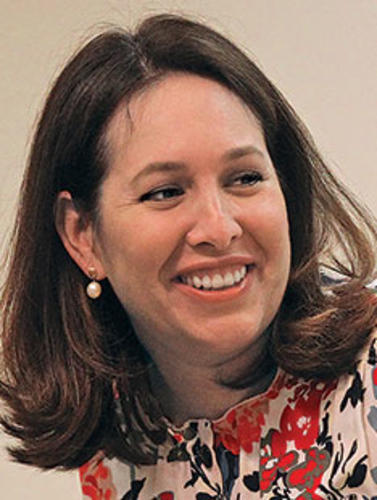

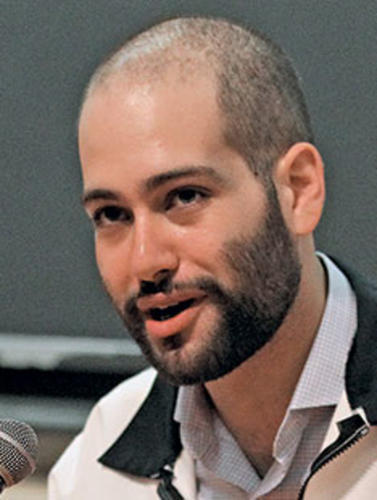


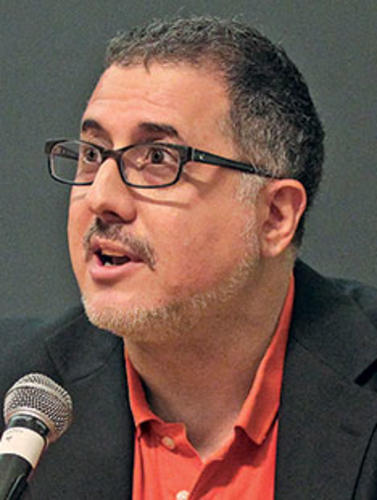
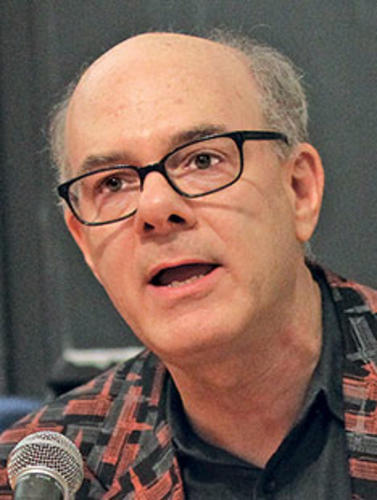




No responses yet